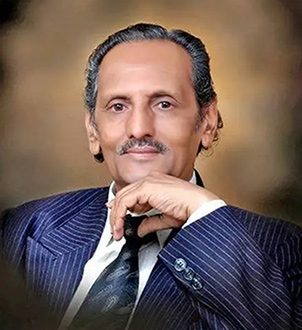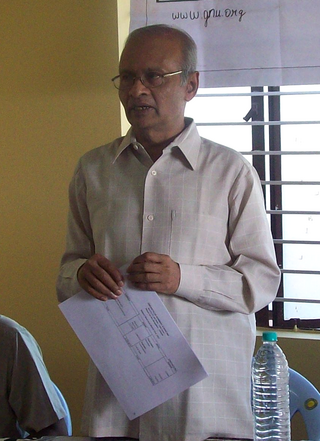
Kuppalli Venkatappa Puttappa, popularly known by his pen name Kuvempu, was an Indian poet, playwright, novelist and critic. He is widely regarded as the greatest Kannada poet of the 20th century. He was the first Kannada writer to receive the Jnanpith Award.

Karnataka Rajyotsava, also known as Karnataka State Day, is a public holiday celebrated annually on 1 November in the Indian state of Karnataka. It commemorates the merger in 1956 of the Kannada-speaking regions of southwestern India under the States Reorganisation Act to form the state.

Kuppali Puttappa Poornachandra Tejaswi was a prominent Indian writer and novelist in Kannada. He also worked as a photographer, publisher, painter, naturalist, and environmentalist. He made a great impression in the Navya ("new") period of Kannada literature and inaugurated the Bandaaya Saahitya genre of protest literature with his short-story collection Abachoorina Post Offisu. He is the son of noted Kannada poet Kuvempu.

Ambale Ramakrishna Krishnashastry (1890–1968) was an Indian writer, researcher and translator in the Kannada language. Krishnashastry has remained popular four decades after his death through his work Vachana Bharata, and his narration of the Hindu epic Mahabharata in the Kannada.

Kokkare Hosahalli Shekh Haider Nissar Ahmed was an Indian poet and writer in the Kannada language. He was awarded the Padma Shri (2008), the Rajyotsava Award (1981) and the Pampa award for his work (2017). He became a household name for his work Nityotsava, which is a poem about Karnataka, a piece he composed after seeing Jog falls. He has numerous poems, translations and children's books to his credit. He is known for using simple words that resonate deeply with the public in his literary work.

Guggari Shanthaveerappa Shivarudrappa, or colloquially GSS, was an Indian Kannada poet, writer, and researcher who was awarded the title of Rashtrakavi by the Government of Karnataka in 2006.
Hampa Nagarajaiah, popularly known by his pen name Hampanā, is an Indian scholar in Kannada language and Jainism. He was born at Hampasandra Village located in Gowribidanur taluk, Chikkaballapura District in the Indian state of Karnataka. Hampanā is married to Kamala Hampana who also a veteran littérateur.
The Rajyotsava Prashasti or Rajyotsava Awards, the second highest civilian honor of the Karnataka state of India are conferred annually by the Karnataka Government on the occasion of the establishment of the state on November 1, celebrated as the Kannada Rajyotsava.

Ganjam Venkatasubbiah, also known as G. V., was a Kannada writer, grammarian, editor, lexicographer, and critic who compiled over eight dictionaries, authored four seminal works on dictionary science in Kannada, edited over sixty books, and published several papers. Recipient of the Kannada Sahitya Akademi Award and the Pampa Award, Venkatasubbiah's contribution to the world of Kannada Lexicography is vast. His work Igo Kannada is a socio-linguistic dictionary which encompasses an eclectic mix of Kannada phrases, usages, idioms, and serves as a reference for linguists and sociologists alike.

K. Chidananda Gowda is an Indian academic who served as the Vice-Chancellor of the Kuvempu University, which is located in the state of Karnataka, India. He is also the son-in-law of the Kannada Poet, Kuvempu, after whom the Kuvempu University is named. He has published many papers, mainly in the field of pattern recognition.

Malleshappa Madivalappa Kalburgi was an Indian scholar of Vachana sahitya in the Kannada-language and academic who served as the vice-chancellor of Kannada University in Hampi. A noted epigraphist of Kannada, he was awarded the National Sahitya Akademi Award in 2006 for Marga 4, a collection of his research articles.
The Pampa Award is a literary award in the Indian state of Karnataka. The award was established in 1987 by the government of Karnataka. It is the highest literary honor conferred by the Department of Kannada and Culture, Government of Karnataka State, and recognises works written in the Kannada language.

Devegowda Javaregowda, known as De Ja Gou or simply Javaregowda, was an Indian Kannada writer, folklorist, researcher, scholar and academic. He was disciple of authors T.N. Srikantaiah and Kuvempu. His literary career spans over decades in which he wrote over thirty-four biographies in Kannada language and other works including children's literature. He campaigned for the promotion of Kannada language. He had received Pampa Prashasti (1998), Padma Shri (2001) and the Karnataka Ratna (2008) awards for his contributions in literature and education. He became a centenarian in 2015 and died on 30 May 2016.

Devanoora Mahadeva is an Indian writer and intellectual who writes in Kannada language. The Government of India conferred upon him the Padma Shri award, the fourth highest civilian award.

Shantinath Kuberappa Desai was one of the leading modern authors of the Navya (modernist) movement in Kannada Literature.

Kampalapura Veeranna Narayana, also known as KVN, is an Indian linguist, professor of Kannada language and literature, and a literary critic. He is currently the Chairman of the Kuvempu Bhasha Bharathi Pradikara, Government of Karnataka. He hails from Piriyapattana in Mysore district. During his time as a professor in Bangalore University, he initiated investigations into Kannada language and culture from the root level. He served as the registrar of Hampi Kannada University. His major areas of interest are Kannada language, literature, teaching and science.

Kamala Hampana is an Indian writer in Kannada language and Jainism. She was born at Devanahalli, Bangalore, Karnataka. She worked as a scholar, a professor, and a follower of ancient Archaic works. She has undertaken serious study and research in various genres of Kannada literature and has developed some of the most serious ideas of various genres.

Chidananda Parasappa Siddhashrama, known as CPS or Prof. Siddhashrama, is an Indian academic, writer, critic, and poet who is known for his works in Kannada. He is a retired professor of Mysore University where he served as the acting Vice Chancellor. In 2020, for his contributions to the field of literature, Siddhashrama has been awarded the Karnataka Rajyotsava Award by Government of Karnataka.

Chikkanayakanahalli Puttegowda Krishnakumar, commonly known as C. P. Krishnakumar or CPK, is an Indian academic, writer, poet, folklorist, critic and translator in Kannada. CPK has published more than 100 literary works in different genres including poetry, criticism, translation. He was the president at the 78th Kannada Sahitya Sammelana held in Gangavati in 2011.

Taľaku Subbanna Venkannayya was University of Mysore's first Kannada Professor. He was also a popular Kannada writer, translator, editor and teacher who nurtured many later Kannada littérateurs like Kuvempu, D. L. Narasimhachar, T. N. Srikantaiah, K. S. Narasimhaswamy, M. V. Seetharamaiah, C. K. Venkataramaiah, K. Venkataramappa, G. Venkatasubbiah and S. V. Parameshwara Bhatta. In fact, Kuvempu begins his book Sri Ramayana Darshanam with a two-page dedication to his teacher T. S. Venkannayya. T. S. Venkannayya translated the biography of Ramakrishna Paramahamsa from Bengali into Kannada for the first time in 1919. T. S. Venkannayya along with D. V. Gundappa, V. Seetharamaiah, B. M. Srikantaiah and T. N. Srikantaiah were at the forefront of the Kannada Movement from 1920s onwards and were instrumental in the founding of Kannada Sahitya Parishat (Bangalore) and Kannada Sangha at Central College, Bangalore and Maharaja College, Mysore. T. S. Venkannayya was responsible for the organising of the 1931 Kannada Sahitya Sammelan at Mysore.

















